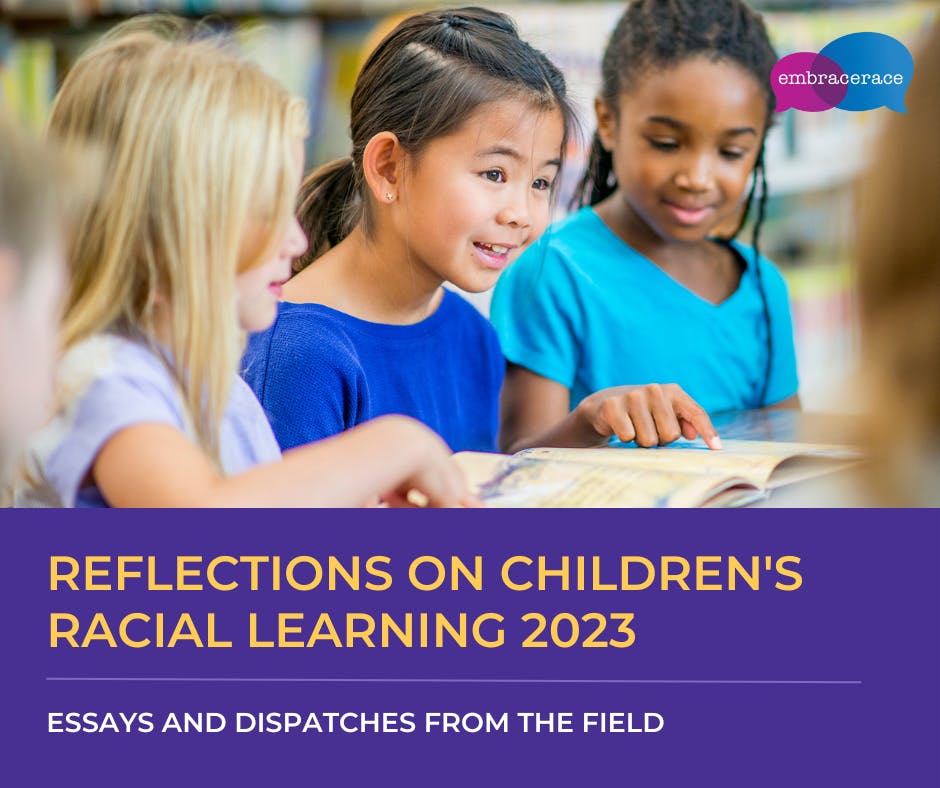Children’s Racial Learning: A Growing Parenting Priority
by Dr. Maryam Abdullah, from EmbraceRace's 2023 Reflections on Racial Learning

Healthy racial learning gives children the opportunity to develop a positive self-image, cultural pride, and resilience when facing racial stress. It also helps children develop positive ways to recognize and celebrate racial differences, and connect over shared strengths, values, and experiences with people across races. Parents can support their children’s healthy racial learning by providing a responsive space for curiosity and conversations. By addressing parents’ needs for credible and practical resources for racial learning, we can help them nurture in children the civil courage needed to promote opportunities for all people to flourish.
In the wake of recent racialized tragedies, many parents have been looking for help with their children’s racial learning — and the active demand for such help has grown substantially even in the past few years. A Google News search for “How to Talk with Kids about Race” revealed over three million results between 2020 and 2022 compared to over two thousand results between 2017 and 2019. The science of children’s racial learning has also continued to grow. In 2022, there was an explosion of racial learning research on White families in response to an urgent call to understand how White children learn about race and how that learning contributes to societal systems that perpetuate destructive racial ideology.1 Research points to insights that could help White children learn to embrace race and disrupt systems to dismantle racism.
As the racial learning science field expands, so has its coverage in Greater Good, the Greater Good Science Center’s free, online magazine. Since the Center’s founding over 20 years ago, Greater Good articles and videos have reported on a range of racial learning research, articles and videos that have been read and watched thousands of times. Our reader engagement provides compelling evidence that parents increasingly want science-based, practical ways to help their children learn about race.
That is why I am excited about the emergence of EmbraceRace, a thought leader and the go-to resource in the field of children’s racial learning for parents and professionals. Families and organizations rely on EmbraceRace not only for its easily accessible knowledge base, such as exceptional webinars and action guides, but also to be a part of a broader community energized to engage complex racial learning questions and devise solutions that need a systems-level approach. A systems view takes a broad and long-term perspective such that children’s racial learning within families is understood to be influenced by dynamic factors beyond the family like neighborhoods, laws, institutions, policies, and history.
What kinds of efforts could help increase momentum among existing and potential partners to engage and contribute to the children’s racial learning field? First, recent research insights make up the building blocks of science-based parenting strategies, but the field needs more guidance in developing research-backed parenting interventions to support children’s racial learning within diverse racial and social identities and across ages. Second, more communities of learning and practice around parenting and children’s racial learning would provide opportunities to engage deeply with resources, share insights and best practices, and build a field that can take collective action to foster systems-level change.
Third, fostering partnerships among groups working on children’s racial learning would leverage the strengths and perspectives of each individual organization to advance solutions with the potential for greater reach and scale than any one organization could achieve working separately. Finally, while there already exists an abundance of children’s racial learning resources, we need better means for getting them to the communities that need them. In all, these efforts would spark even greater hope that together we can foster children’s racial learning to cultivate a race-brave, just, and compassionate society.

This article comes from the introduction of Inaugural EmbraceRace Reflections on Children's Racial Learning. Download all the reflections from leaders attending to children's racial learning in parent practice, education, healthcare, children's media and social science research.
References
1. For example, Cox, B., Hughes, D.L., Das, S., Brown, J., Akles, M., Blood, T., ...& Way, N.(2022).White families’ communications about and around race: Conversations between white adolescents and their mothers.Journal of Research on Adolescence, 32(3), 896-918; Gillen-O’Neel, C., Huynh, V.W., Hazelbaker, T., & Harrison, A.(2022).From kindness and diversity to justice and action: White parents’ ethnic–racial socialization goals.Journal of Family Issues, 43(4), 944-973.
Maryam Abdullah



